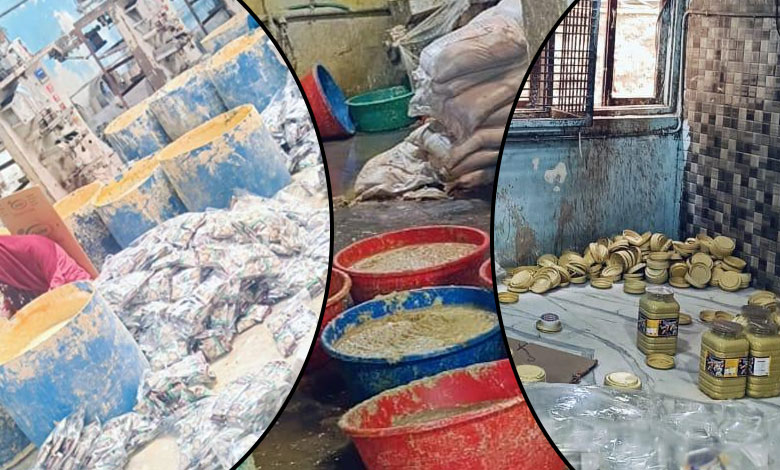Raids in Hyderabad Uncover Unhygienic Factories; 1400 kg of Ginger Garlic Paste Seized for Adulteration Concerns
The food safety raids led to the seizure of 1400 kg of ginger garlic paste, raising alarm about the standards of food manufacturing in the city.

Hyderabad: In a major crackdown on food safety violations, authorities in Hyderabad uncovered severe hygiene issues and possible adulteration practices at two factories in the Katedan industrial area. The food safety raids led to the seizure of 1400 kg of ginger garlic paste, raising alarm about the standards of food manufacturing in the city.
Food Safety Raids Expose Deplorable Conditions at Hyderabad Factories
The food safety operation targeted two facilities, with inspectors discovering unsanitary conditions and evidence of poor manufacturing practices. The raids were initiated following growing concerns about food quality and safety standards in local factories. The findings highlight the urgent need for stricter regulations and regular inspections to prevent contamination and ensure public health.
At Umani Foods International, food safety officials encountered serious violations. The factory was found to be operating without the mandatory name board or address, a clear indication of negligence in adhering to basic legal requirements. Upon inspection, the team discovered 400 kg of packed ginger garlic paste and 50 kg of synthetic food color, raising suspicions about adulteration in the production process. Laboratory tests have been requested for further verification.
The facility itself was in a deplorable state, with significant hygiene lapses. Water stagnation was observed in cleaning areas, and cobwebs were found on walls and ceilings. In addition, open sections of the factory were exposed to the external environment, increasing the risk of contamination.
The food handlers, who were tasked with preparing the ginger garlic paste, were seen without the necessary protective gear, such as gloves, aprons, and hair caps. Moreover, the factory was missing essential pest control and water analysis reports, further underscoring the unsanitary practices at the facility.
Also Read: Hyderabad: Four-Storey Building Tilts in Gachibowli: Video
Seizure of 1000 kg of Ginger Garlic Paste at Another Hyderabad Factory
The second raid targeted a popular factory in the same region, where food safety officials seized 1000 kg of ginger garlic paste. The factory was found to be operating under equally unsatisfactory conditions, with water stagnation near critical areas like the grinding zone, and the absence of any protective measures such as insect-proofing to prevent contamination from the external environment. Loose plastering above grinding areas posed additional health risks, as the area was exposed to potential contamination.
The factory was also missing vital documents, including medical fitness certificates for its workers and pest control records, further raising concerns about the facility’s adherence to food safety norms.
Adulteration Concerns and Risk to Public Health
The raids have raised serious concerns about the safety of ginger garlic paste and other food products manufactured in these facilities. Adulteration of food products, such as the use of synthetic food color, is a significant public health issue. The presence of poor-quality ingredients and unsanitary practices increases the risk of foodborne illnesses and contamination, which could potentially harm consumers.
Food safety experts stress the need for stronger regulatory oversight and regular inspections to ensure food manufacturers comply with established hygiene standards. The discovery of substandard practices at these factories serves as a stark reminder of the potential risks posed by poorly managed food production facilities.
The Need for Stricter Regulations and Regular Inspections
The findings from these raids underscore the pressing need for authorities to enforce more stringent measures in food production. With the rising demand for packaged foods and condiments like ginger garlic paste, it is essential that food manufacturing units in Hyderabad prioritize hygiene and food safety at all stages of production.
Call for Improved Standards in Food Manufacturing
Food safety officials have called for greater accountability from food manufacturers and emphasized the importance of adhering to safety protocols to safeguard public health. The lack of adherence to basic standards of cleanliness, such as proper protective gear for workers and pest control measures, highlights significant gaps in food manufacturing practices.
To ensure food safety in the city, regular inspections and stricter enforcement of regulations are essential. The Hyderabad raids serve as a wake-up call for the food industry to step up their efforts in maintaining cleanliness and compliance with safety regulations.
Conclusion: A Wake-Up Call for Hyderabad’s Food Industry
The recent raids in Hyderabad’s Katedan area have exposed shocking hygiene violations at food manufacturing units, with 1400 kg of ginger garlic paste seized for suspected adulteration. These revelations serve as a crucial reminder of the importance of food safety, cleanliness, and transparency in the food manufacturing process. It is imperative that food producers prioritize the health and safety of consumers by complying with established safety standards and undergoing regular inspections.
As authorities continue their investigation, the hope is that this operation will lead to stronger food safety practices across Hyderabad’s food industry, ensuring that consumers are protected from substandard and unsafe food products.
